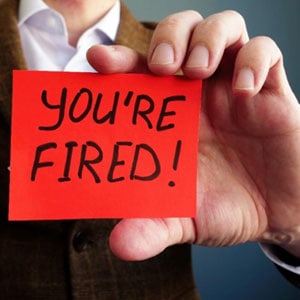
Chances are, after being fired, you may feel helpless or lost; you might even feel angry or vengeful. The good news is that if your employer broke the law by firing you, they are guilty of wrongful termination. If this is the case, they can be punished through a claim they will either have to settle or face you in court over. This article explains:
- Where, when and how you can make wrongful termination claims against your employer after getting fired.
- The deadlines for filing a wrongful termination claim in California.
- The potential outcomes for a wrongful termination claim, from settlements to lawsuits.
What Are Workplace Retaliation And Discrimination Wrongful Terminations?
If you have been fired, it might have been perfectly legal, if highly inconvenient and disrupting. But there is also a chance it was an illegal move by your employer.
Workplace retaliation is one of two big categories of illegal firings (or wrongful terminations, in legal terminology). It occurs when an employer fires someone in reaction to something the employee had a right to do, such as blowing a whistle on illegal behavior or complaining about sexual harassment in the workplace.
Discrimination is the other major category of wrongful terminations. This occurs when you are targeted or mistreated for your race, disability status, nationality, sexual orientation, age, gender, and other protected categories. If the employer discriminated against you and then took adverse action, like firing you when you complained, that would certainly support a claim of wrongful termination retaliation.
Whenever you report something to your boss or manager, and instead of doing something to address the problem, you are disciplined, fired, or pushed out, that is a case of retaliation.
How Do I File A Wrongful Termination Claim For Retaliation Or Discrimination Against My California Employer?
If you suspect you have been fired for illegal reasons, such as retaliation or discrimination, you will want to bring a wrongful termination claim against your employer for the losses and harm you endured. Doing so, however, is not nearly as easy as it was for your employer to fire you.
To begin with, you will need proof. You want important evidence, in writing, if possible, that confirms your version of events. Documentation that you reported some sort of misconduct can include emails, text messages, and memos. Whenever you are whistleblowing, it is important to make sure you document your efforts; that way, it is much harder for the employer to deny later.
Documentation is also important to dispute or disprove any alternate version put forward by your employer. If you have had nothing but positive performance reviews until the day you report a case of sexual harassment, that will help your case.
If you can demonstrate very early through competent evidence that the employer is at fault, in other words, that they are liable for the claims, the employer is unlikely to fight it. This usually leads to the case quickly settling in your favor.
Even if you do not have a perfect record, this does not mean you do not have the right to claim compensation for being unjustly fired. However, it might make it more complicated to prove.
What Damages Can I Claim In A Wrongful Termination Claim In California?
If you have been let go unjustly and illegally, you have a right to financial compensation for a number of different losses and harms it caused, including:
- Wages lost
- Future wages
- Reinstatement
- Attorney fees and other costs
- Emotional harm caused by the termination or loss of employment
In many cases, this can add up to substantial sums. When you have lost all income, that money is a much-needed lifeline to help get your life back in order.
What Is The Deadline For Filing A Complaint Or Lawsuit Against A Former Employer For Wrongful Termination?
The deadline for filing your wrongful termination claim or complaint will depend on the agency and law under which you are filing the complaint. If the termination was in violation of public policies, then the statute of limitation of two years applies. This means you have just two years to file. The same deadline applies if there was a breach of your contract.
For regular tort claims, on the other hand, such as whistleblower retaliation or discrimination, you have three years to file under the Labor Code. However, before filing a wrongful termination claim for retaliation, discrimination, or sexual harassment, you have to exhaust administrative remedies with the California State Department Of Fair Employment and Housing.
In other words, you will have three years to file a request for the right to sue with them. Once the right to sue is issued by the department for employment, you have one year to file the actual lawsuit.
When Should I File My Wrongful Termination Claim In California?
Just because you have two or three years to file does not mean you should wait to do so. People, including potential witnesses, forget things. People change jobs, and evidence can be lost, misplaced, or even destroyed. The faster you take action, the better your chances of gathering the evidence you need to make a strong claim for compensation.
It also sends a message when you act promptly that you are serious and that your claim needs to be taken seriously. It pushes the guilty party to take action, improving your chances of reaching a positive outcome without having to go through an expensive court trial.
What Outcomes Exist For Wrongful Termination Claims Or Cases? Will I Have To Go To Court?
Wrongful termination claims are, in many ways, a threat of legal action. They say you are ready to take your former employer to court and win. But that threat can be used to reach an outcome well before either of you have to step into a courtroom.
In fact, there are many ways a wrongful termination can be resolved. Some of these will not require even filing the lawsuit, though you should always be ready to, just in case a deal falls apart at the last minute.
- Negotiation. You, or more wisely, your lawyer, can send a demand letter or pick up the phone and talk to opposing counsel. Together, they can try to reach an outcome everyone is happy with, such as a settlement.
- Settlement. The vast majority of wrongful termination claims will result in a payout without having to get one imposed by a judge. The timing of the settlement, however, can vary greatly.
- Pre-litigation settlements occur if you make a reasonable offer before the lawsuit is filed and it is accepted by the other side.
- Back-and-forth negotiation. More often, it will require several rounds of back and forth between attorneys and parties to reach a financial compensation settlement both can agree on.
- Post Filing. Filing a lawsuit and serving it to your former employer shows you are serious and ready to win; this will often push them to accept a settlement.
- Mediation. Whether imposed by the court or agreed to by both you and your employer, mediation is the process of trying to reach a settlement with the help of a neutral third party (most often a retired judge or an experienced attorney)
- Finally, there are also judicial settlement conferences where a judge will preside over the case in a more formal version of mediation.
- Penultimate moment settlement. If the case continues, sometimes one party or another will agree at almost the last minute to a settlement they had previously refused if they believe they will lose. However, doing so is rare since it means they have spent most of the same costs.
A settlement reached through negotiation, mediation, or other means is often an ideal outcome to a wrongful termination claim since it can spare both parties some or all of the cost of the trial. However, reaching one often requires going to the negotiation table with a reasonable and open mindset.
In many ways, the lawsuit itself is merely a more formal extension of the negotiation process. Both parties present their arguments and evidence in an attempt to convince or force the other to accept the conditions they believe to be fair.
Understanding that dynamic and knowing how to use it to your advantage are two of the key skills brought to the table by an experienced attorney. Without one, you might easily get lost or taken advantage of during negotiations and end up settling for an offer well below what your wrongful termination claim is worth. For more information on Wrongful Termination Claims And Lawsuits In CA, an initial consultation is your next best step.
Attorney David Kaufman has many areas of proficiency, the first and foremost of which is personal injury representation – where he serves injured accident victims in La Jolla and surrounding areas of California. Attorney Kaufman brings an impressive ease with words to the explanation of a complex and emotionally difficult field, helping accident victims understand how to recover their sanity as well as substantial financial compensation
Connect with the Law Offices of David A Kaufman, APC for keen-minded and easy-to-follow insights on how to navigate the field of personal injury law in California.
Call For A Free Consultation - (619) 865 8648.
